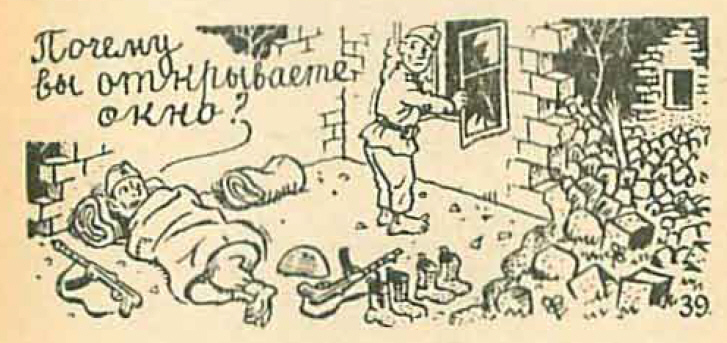
|
Languages
|
| Russian for English speakers 39 |
 |
| Lesson 39 |
|
137 |
Russian |
English Английский |
|
Тридцать девятый (39-й) урок |
Thirty ninth lesson |
|
|
УРОК НОМЕР ТРИДЦАТЬ ДЕВЯТЬ (№39) |
Lesson number thirty nine (#39) |
|
|
Пойдём завтра утром (1)... |
We shall go to-morrow morning | |
| 1 |
Который у вас час? |
What time do you make [what with you time]? |
| 2 |
Значит уже поздно идти
[итти] в банк; |
(It) means (that) (it is too) [already] late to go to the bank ; it will be shut. |
| 3 | Ничего; завтра утром пойдём. | It does not matter; tomorrow morning we shall go. |
| 4 | Но мы должны ехать (2) на аэродром. | But we must go to the aerodrome. |
| 5 | Верно; мы поедем (2) в десять часов (N. 4), | (It's) true; we shall go at ten [of hours] ; |
| 6 | a прежде мы успеем зайти в банк; | but previously we shall-have-time to pass at the bank, |
| 7 | он открывается (3) в девять. | it opens at 9. |
| 8 | А сегодня вечером, что будем делать? | And to-[day] night, what shall we do? |
| 9 | После обеда пойдём в кино; | After dinner, let's go to the cinema; |
| 10 | надо рано ложиться спать, | it is necessary to go to bed [lie down sleep] early, |
| 11 | чтобы вовремя встать. | to get up in time. |
| 12 |
Вот уже целую неделю, как мы ложимся спать после полуночи, |
For the whole past week already [Here is already whole week
as to bed] |
| 13 | a встаём часов в десять (4) . | and we get up towards 10 [hours]. |
| 14 | Надо хоть раз в жизни изменить (5) наши привычки. | It is necessary, at least once in life, to change our habits. |
| 15 | прежде; закрыт; открыт; утро; привычка (6) | previously; shut; open; morning; habit. |
| 16 | неделя; месяц; полночь; полдень (7). | week ; month ; midnight; midday. |
|
УПРАЖНЕНИЕ |
EXERCISE | |
| 1 |
Почему вы открываете окно?
|
Why do you open the window? I am cold [to me cold]. |
| 2 |
Куда вы хотите ехать? - На улицу Горького, дом пять. |
Where do you want to go [drive]? — [On] Gorki Street [s. of G.], number [house] 5. |
| 3 |
Музей кажется сегодня целый день закрыт. |
The museum, it seems to me, is shut all day to-day. |
| 4 | Дайте что-нибудь этому бедному человеку. | Give something to this poor man. |
| 5 | Читали ли вы вечернюю газету? | Did you read an (or the) evening paper? |
| 6 | Мне некогда зайти к нему теперь. |
I have not the time to pass at his house now. |
| 7 | Ложитесь спать рано. | Go to bed early. |
| ДОБАВОЧНОЕ УПРАЖНЕНИЕ |
ADDITIONAL EXERCISE |
|
| 1 | Вот газета. | Here is a (or the) newspaper. |
| 2 | Купите газету. | Buy a (or the) newspaper (acc.). |
| 3 | У меня нет газеты. | I have no newspaper (genit.). |
| 4 | Что вы делаете с этой газетой? | What do you do with this newspaper? (instr.). |
| 5 | Ничего нет в газете. | There is nothing in the paper (prepos.) |
| 6 | Сегодня прекрасное утро. | The weather is very fine this morning [to-day very fine morning]. |
| 7 | Я работал до утра. | I worked until morning (gen.). |
| 8 | Утром не могу спать. | In the morning (instr.), I can't sleep. |
| 9 |
Целый день; целое утро; целый вечер; целая неделя. |
All day; all the morning; all the evening; all the week. |
| Я не привык к этой жизни | I am not used to this life. | |
| Неужели вы ещё не привыкли? |
Have you really not got used (to it) yet? |
|
| Который час ? | What time is it? | |
| В котором часу? | At what time? |
|
NOTES - ЗАМЕТКИ |
|
| 1 |
В одно прекрасное
утро : one fine morning (nomin.). |
| 2 |
Ехать
: to go (by some conveyance);
идти, to go on foot. |
| 3 |
Открывать, закрывать, to open, to shut. Открыт, закрыт, open, shut. |
| 4 |
В десять часов:
at 10 [hours]. |
| 5 |
Хоть:
at least. |
| 6 |
Я привык,
I (am) used; это моя
привычка: this is my habit. |
| 7 |
Let us recall полчаса,
half an hour; |